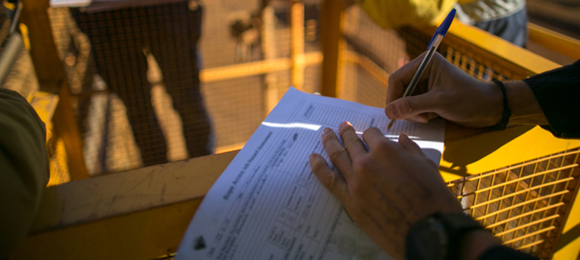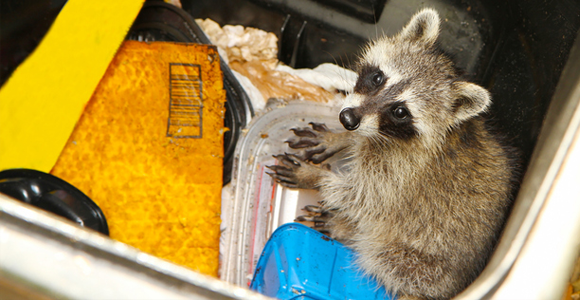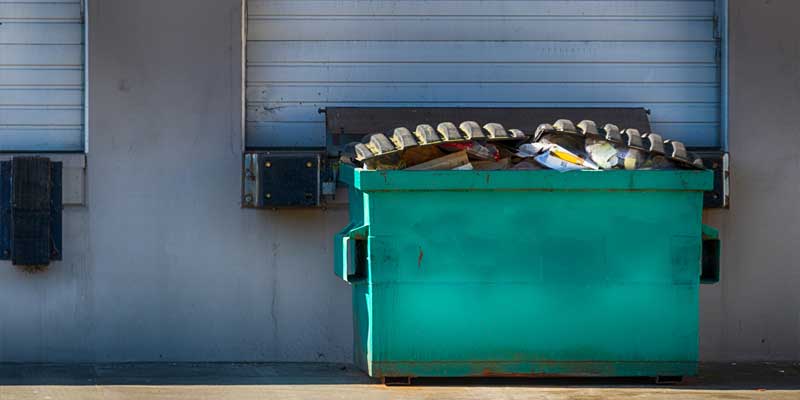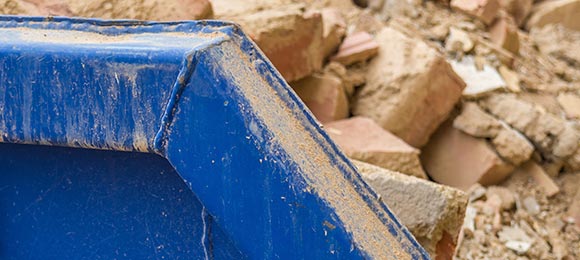
Updated September 13, 2023
What’s the best way to get rid of _______? Not all wastes are destined for the trash can. If you have large amounts of debris or you have items that are banned by your local waste hauler, you need to find the right disposal option. In this debris removal guide, we’ll take a look at various types of waste, debris, and junk as well as the best ways to dispose of them.
Table of Contents:
Find dumpster rental companies or junk removal providers near you
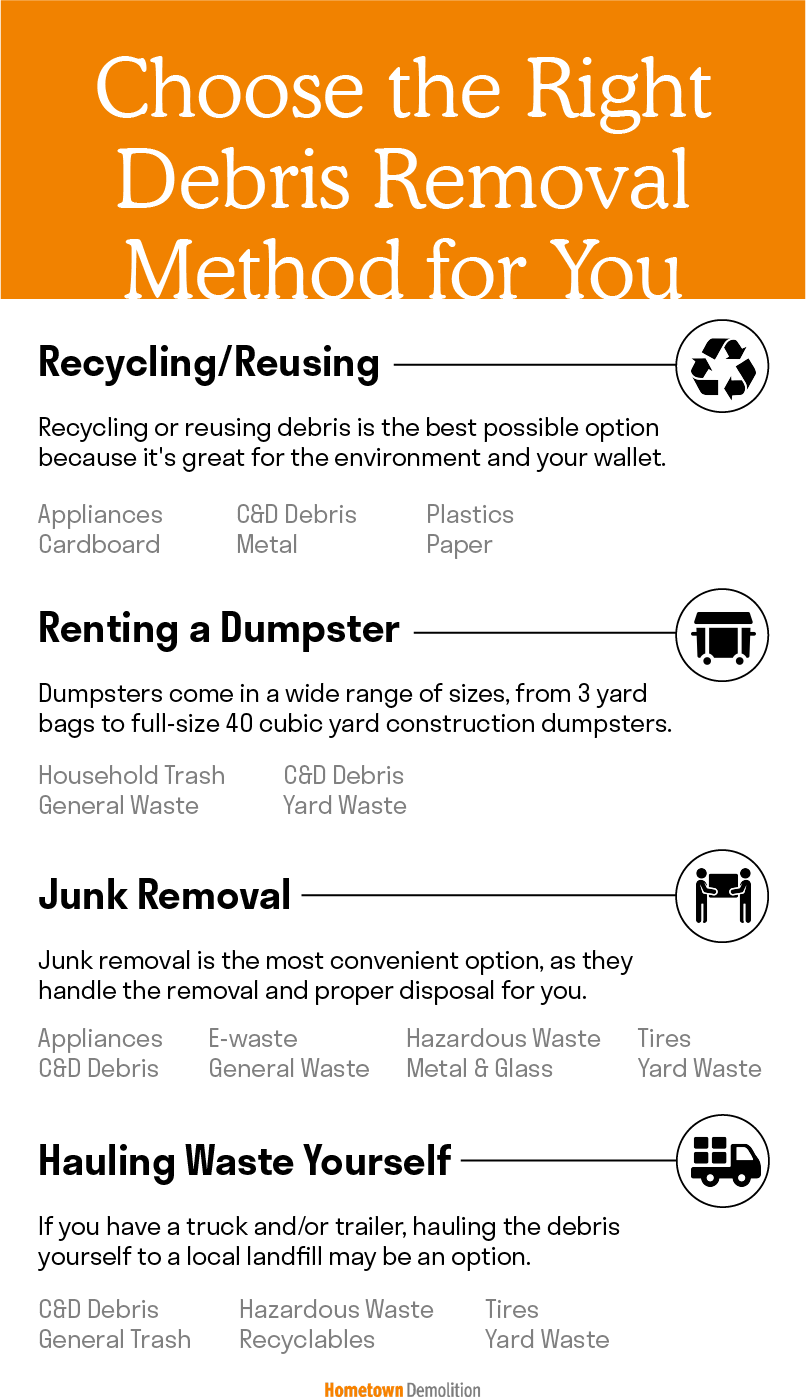
Popular Waste Disposal Options
Recycling/Reusing
Recycling or reusing debris is the best possible option because it's great for the environment and your wallet. According to the Environmental Protection Agency (EPA), Americans only recycle about 1/4 of a potential 267.8 million tons each year. Always recycle, reuse, or donate materials when you can, but if this is not an option, it's time to start considering the next disposal options.
Keep reading:
- What to Look for When Using a Hauling Service for Recyclable Materials
- Benefits of Recycling Junk vs Throwing it Away
- Rent a Recycling Dumpster: Sizes and Costs
Renting a Dumpster
Dumpsters come in a wide range of sizes, from 3 cubic yard dumpster bags to full-size 40 cubic yard construction dumpsters. Dumpsters are an ideal solution for remodeling projects, house cleanouts, demolition, yard waste disposal, roofing, construction, and recycling in bulk. Ranging in cost from $250-$550 on average, dumpsters are an affordable way to get rid of all types of debris. Only place approved items in your dumpster, and avoid putting any prohibited or hazardous items inside, or you can expect to be charged an additional fee.
Read on:
Junk Removal
Junk removal is a great disposal option for household junk, large pieces of furniture, and other tough-to-dispose-of or bulky waste. Junk removal is the most convenient option, as they handle the removal and disposal for you, whether it be hauling the junk to a local donation center, recycling it, or hauling it to the nearest landfill as a last resort. Due to the all-inclusive level of service, junk removal can become costly for larger cleanups, so it’s something to consider when choosing whether you should rent a dumpster or hire a junk removal service.
Learn more:
- Comparing the Cost of Junk Removal to Dumpster Rental
- Understanding Junk Removal Quotes
- How to Choose the Best Junk Removal Company
- What Junk Removal Companies Will and Won't Take
Hauling Waste Yourself
If you have a truck and/or trailer, hauling the debris yourself to a local landfill may be an option. The average cost to haul waste yourself is less than the average cost to rent a roll-off dumpster, but the trade-off is it's less convenient and takes longer. The time it takes you to drive and drop off the debris at the nearest landfill can be substantial depending on your location. Also, if you need to dispose of hazardous materials, it will require a permit to haul, so be sure to research the laws in your area regarding the types of waste you are allowed to haul and the types of debris accepted at local landfills. (Some accept only C&D debris and not household trash). Household hazardous waste (HHW) facilities safely process and recycle potentially toxic wastes, such as e-waste, household cleaners, paint, chemicals, medicines, and liquids. Some communities host HHW events on an annual or biannual basis, or you can find your nearest HHW drop-off location at Earth911.com.
Find out more: Cost of Hauling Waste Yourself vs Renting a Dumpster
Find dumpster rental companies or junk removal services near me
Types of Junk, Waste, and Debris
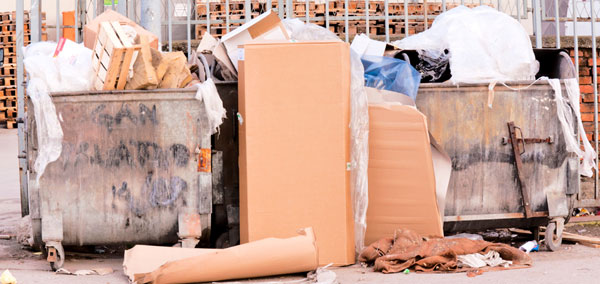
The waste and junk disposal methods discussed above are not always an option for everyone in every situation. Below, we'll discuss the most common types of waste and debris and the ideal ways to dispose of each type properly.
Read on:
- Declutter Your Home to Boost Its Value
- How to Efficiently Clean Up a Foreclosure or Eviction Property
- Disposal Options for Interior Demolition Debris
- 5 Tips for Construction Debris Disposal
Household Trash and General Waste
Examples: household garbage, old furniture, broken toys, packaging materials
This category of waste includes anything you’d typically put in your waste bin. Generally, this category of waste is taken care of via your waste hauler’s curbside collection service. However, there are multiple situations that require additional means, like hoarding situations, foreclosure cleanups, moving, and special events that generate a lot of trash. When you have more than your curbside roll cart can handle, a roll-off container works great for bulk amounts of household trash.
Alternatively, hiring a junk removal company to pick up the trash for you is a convenient disposal method, too, and it may be a more cost-effective option for smaller jobs (less than a few cubic yards of waste). You could also haul these wastes to the landfill yourself if you live within close proximity of one. Disposal of appliances containing Freon, paints, liquids, lead-acid batteries, fluorescent light bulbs, and other household hazardous wastes (HHWs) require special handling. These wastes shouldn’t be mixed in with your household garbage. Contact your city’s solid waste department to find the nearest HHW facility, or visit the city’s website for more information.
Construction & Demolition (C&D) Debris
Examples: concrete, shingles, lumber, carpeting, flooring, siding, metal, renovation debris
Residential and commercial construction or demolition projects typically require the use of a dumpster, though hiring a junk removal company or driving the debris to the landfill yourself may be an option if there is a relatively small amount of debris. Some U.S. cities require C&D debris to be dropped off at dedicated construction and demolition landfill facilities where it is separated and recycled.
Concrete
Concrete and asphalt are both very heavy, dense debris that are best disposed of in a roll-off dumpster. Most dumpster rental companies require concrete to be separated from other wastes, and it must be "clean loaded" in a smaller container, such as a 10 yard bin, to ensure it does not become too heavy of a load for the roll-off truck to handle.
Roofing Shingles
This is another heavy debris, so shingles are generally loaded in a separate dumpster and not in mixed loads. Shingles are recycled in most municipalities.
Wood/Lumber
Wood has a potential to be reused if salvaged properly. Reclaiming wood and selling or donating it is one way to cut down on disposal costs for a project.
Carpeting
A junk removal company offers the most convenient disposal solution for carpet disposal. Renting a dumpster or having your waste hauler pick it up are also valid options. Many waste haulers require the carpeting to be cut down to a specified length, like 4 ft. lengths, so that may add to the inconvenience of going this route.
Flooring
Flooring material is salvageable in many cases. This would, again, help cut down on disposal costs. If reclaiming the wood isn’t an option, other cost-effective solutions include renting a roll-off or hiring a junk removal company to pick it up.
Siding
Certain types of siding, such as cedar, are highly desirable, and people will often take it off your hands. Simply posting a listing on Craigslist is an easy way to accomplish getting rid of cedar or wood siding while also cutting down on disposal costs. Vinyl siding is typically disposed of in a dumpster or picked up by a junk removal company. A dumpster is generally the more cost-effective option for a whole-house siding replacement project.
Kitchen/Bathroom Renovation
Examples: cabinets, tubs, sinks, toilets, countertops, floors
Much of this material can be reclaimed. Other materials can be disposed of in a roll-off container or by a junk removal service. Most waste haulers do not accept renovation debris via curbside service, though some will pick it up for an additional fee.
Metals
Bulk amounts of steel, aluminum, copper, and other metals should be recycled, as metal is a valuable commodity. You can eliminate disposal costs and make a few bucks by dropping off metal scraps at a local scrap yard. If you cannot haul the metals yourself, some metal recyclers may be able to pick it up on-site, or you can post an ad on Craigslist for free pick-up.
Find dumpster rental companies or junk removal providers near you
Yard Waste
Examples: tree limbs, bush trimmings, grass clippings
Being that it’s an organic waste, yard debris is best disposed of by composting, but dumpsters and junk removal companies are good options, too, as dumpster companies and junk removal service providers will drop off the yard wastes at the proper facility.
Note: Most waste haulers don’t allow yard debris mixed in with general waste.
Heavy yard wastes, like downed trees/logs, are best handled by professionals who have the right equipment to safely load and haul away such debris. Most junk removal companies have the right equipment to take on this type of project.
Consider starting a compost pile if you have the space to do so. Composting is an easy and inexpensive disposal option for yard debris, plus it produces nutrient-rich compost ideal for farming, landscaping, and flower gardens.
Be sure you know the laws regarding yard waste disposal in your area. Some cities have made yard debris composting mandatory. In this case, you’d need to have the debris dropped off at the proper composting facility. It may not be accepted at the municipal landfill, so be sure to do your due diligence. Search your city’s solid waste authority website or give them a call to learn more.
Appliances
Examples: kitchen stove (range), microwave, washer, dryer, dishwasher, refrigerator
Hiring a junk removal company for removal of one or several appliances is a quick and cost-effective method of removal. Junk haulers charge a minimum fee of anywhere from $50 to $125, so expect to be charged at least that amount for the appliance removal.
A dumpster works well for disposal of a whole home's worth of appliances, such as during a major renovation project or demolition. Choose a bigger dumpster than you think you need. Why? Most roll-off containers have rounded bottoms, while most appliances are bulky and square. So while you may have 10 cubic yards worth of appliances (10 kitchen stoves equals approximately 10 cubic yards), the appliances will consume greater than 10 cubic yards worth of space inside the dumpster. In this example, a 20 yard bin may be the better choice.
Save on disposal costs by donating working appliances to local charitable organizations, such as Habitat for Humanity. Some locations may even pick them up for free, so be sure to ask! Alternatively, you can sell appliances that are still in good shape via Craigslist, Facebook, or by other means.
Household Hazardous Wastes (HHWs)
Examples: lead-acid batteries, fluorescent bulbs, household cleaners, motor oil, chemicals
This class of wastes should never be mixed in with the general waste stream, so avoid putting household hazardous wastes in the waste bin, dumpsters, burning it, burying it, or using any other unsafe disposal method. Doing so can taint drinking water, harm local wildlife, produce unsafe crops at local farms, and pollute the air. Dispose of HHWs by dropping them off at a local HHW processing facility. Some communities also host annual or biannual HHW pickup events where you can drop off a wide range of hazardous wastes found in your home.
Junk removal companies and some dumpster rental providers will accept HHWs if you discuss it beforehand. There may or may not be additional fees for handling/hauling of hazardous materials—it depends upon the company and local laws governing HHW handling. Find a household hazardous waste recycler near you.
Here’s a quick breakdown of common types of HHWs:
Batteries
Common A, AA, AAA, D, and similar dry-cell batteries can be thrown away with your trash. However, car batteries and other larger batteries need to be properly recycled.
Liquids
This includes motor oil, antifreeze, household cleaners, fuel, and other toxic/flammable liquids. Motor oil can be safely dropped off for recycling at a local oil change facility or car dealership that provides service. Other liquids can usually be dropped off at an HHW facility or cleanup event.
Light Bulbs
Fluorescent bulbs (CFLs) shouldn’t be mixed in with household trash. They contain small amounts of mercury. Drop these off at the nearest recycling facility that accepts CFLs. Some retailers, such as Lowe's and IKEA, also accept CFLs for proper recycling. Learn more about CFL recycling.
Medicines
Dispose of medications at your local cleanup event or HHW processing facility.
If you do not have access to this type of event or facility, you can dispose of medicines in the following manner:
- Mix medicines with dirt, kitty litter, or coffee grounds.
- Place in a plastic Ziploc bag and seal it.
- Throw the bag in your trash receptacle.
- Remove prescription labels and/or scratch out any personal information on the bottle to protect your privacy. Throw bottle(s) away.
Explosives
Highly-flammable, combustible, and explosive wastes can be dangerous when mixed in with the general waste stream. Local laws dictate the proper way to dispose of wastes, like fuel, oil, fireworks, lighter fluid, matches, and others.
Paint
Wet paint must be dried before throwing it away. You can mix bulk amounts of paint with sand or similar material to dry it quickly. You can safely throw empty, dry paint cans into the trash or a rented dumpster. The one exception is if the paint is very old and may contain lead. It is unlikely this will be an issue considering lead paint was banned in 1978 (although lead-based paint was still sold for several years after that). If it’s a very old can of paint you need to dispose of, play it safe and bring it to a local recycling facility for proper disposal.
Recyclables
Examples: paper, cardboard, plastics, metal
Despite the slight downturn in recycling noted in recent history, access to recycling services is pretty extensive these days. For bulk amounts of recyclables, you have several options. Renting a dumpster is a quick and easy option for DIYers. Clean load it with recyclable materials only and the rental company may offer a discount. Junk removal is usually more expensive than renting a dumpster but is also much more convenient. Dropping recyclables off at a recycling center is the most cost-effective method for handling a low volume of recyclables. Posting an ad on Craigslist or Freecycle is another cheap and convenient way to get rid of recyclables. The potential downsides include having to wait potentially days or weeks (if ever) before finding someone to pick it up, and this method is generally limited to working well for valuable recyclables, such as metals.
Bring scrap metals, like copper pipes, steel, brass fittings, iron, junk cars, etc., to a local metal scrap yard to get paid for your scraps. Some recycling facilities will even purchase bulk amounts of paper, cardboard, and plastics. For example, Padnos is a full-service recycler serving most of the State of Michigan and will purchase most types of recyclables (in bulk amounts).
Food Scraps and Organic Waste
Food and organic scraps can be composted. Not all food scraps are ideal for composting, however. Wastes that are excellent compost materials include:
- Egg shells
- Fruit and vegetable scraps
- Coffee grounds and filters
- Clean paper and newspaper
- Vacuum residuals
- Hair and nail clippings
- Dirt, soil, grass clippings, dead leaves, and small tree limbs
See a complete list of compostable items and learn how to get started. Do not compost meats, cheeses/dairy, plastics, fats, dirty paper/paper towels, breads, dog/cat wastes (grass-eating animal wastes are ok), or processed foods. If you have a bulk amount of food or organic waste to dispose of, discuss solutions with your waste hauler or a dumpster rental provider near you.
Read more: Let’s Talk About Food Waste
Tires
Tires are banned for disposal in landfills in the majority of states within the United States. Instead, they can be recycled or reused. Bring old automobile tires to a tire retailer for recycling. There may be a small fee involved in some cases. Alternatively, you can sell or give away tires that still have some tread left. Recyclers, artists, and companies that work with rubber may also take them off your hands for free. Post an ad on Craigslist, Facebook, or Freecycle.org to get started. Junk removal companies also haul away tires, and this is a cost-effective and convenient option if you have a large number of tires to offload.
Find out more:
Asbestos, Mold, and Lead Paint
Found on drywall, paint, roofing materials, and other building materials. These toxic substances are more prevalent in older homes or commercial buildings. Before starting a renovation, demolition, or construction project in an older home, be sure to have it tested for asbestos, mold, and lead paint.
Asbestos
When left alone, asbestos isn’t harmful. But once asbestos fibers are released into the air, they become a danger. Renovation and demolition is when asbestos is most likely to be released into the air. Exposure can lead to lung cancer, mesothelioma, and lung problems.
Keep reading: How to Determine If Your Home Contains Asbestos
Mold
Avoid dangerous mold by controlling moisture inside your home, repairing leaks, and cleaning up after natural disasters. Mold can often hide behind walls. If you spot a large area of it, it’s best to leave the removal to the professionals. In terms of disposal, a mold removal specialist will properly discard of the materials for you. Otherwise, you can dispose of small quantities of moldy materials in a dumpster if the debris is bagged or wrapped in plastic.
Learn more: How to Safely Remove Mold from the Home
Lead Paint
How you dispose of lead paint debris depends upon how much of it is present and what your state’s laws are regarding disposal. If a sample of the debris contains less than 100 milligrams of lead per kilogram, you can typically dispose of it like regular municipal waste. If concentrations of lead are greater than that benchmark, special disposal procedures must be followed. It’s best to hire a lead paint abatement specialist to test for lead paint and to dispose of it if necessary. To summarize, asbestos materials always require special disposal procedures, while mold and lead paint tainted debris can be disposed of the same way you would any other C&D debris as long as the levels are low.
Rent a dumpster for larger cleanups, or hire a junk hauler to come pick up smaller amounts of debris. Always inform the rental company or junk removal provider that the debris is tainted.
Automobile Fluids and Chemicals
Examples: motor oil, antifreeze, transmission fluid, cleaners, brake fluid
Most chemicals and liquids are required to be disposed of at a licensed household hazardous waste (HHW) facility. Cities that do not have such a facility will typically hold HHW collection events once or twice per year where you can drop off chemicals and other hazardous wastes. Used motor oil can be brought to an oil change facility or auto parts store for proper recycling. Call ahead just to be sure.
Never dispose of auto fluids or chemicals in the trashcan or a dumpster. Refer to Earth911 for more information and to find a local automotive fluids recycler near you.
Electronics (E-waste)
Examples: computers, TVs, VCRs, DVD players, tablets, phones, other electronic devices
Electronic waste, or e-waste, is growing in the U.S., and proper disposal of this debris is often misunderstood. Most e-waste is not allowed in the general waste stream; it should be properly recycled to avoid heavy metal contamination and other potential hazards. Some states, including California and New York, have banned disposal of e-waste in landfills or waste-to-energy (WTE) facilities. Instead of throwing e-waste in the trash, it should go to the proper recycling facility.
Keep reading: Recycle Your Electronics With Junk Removal Services
